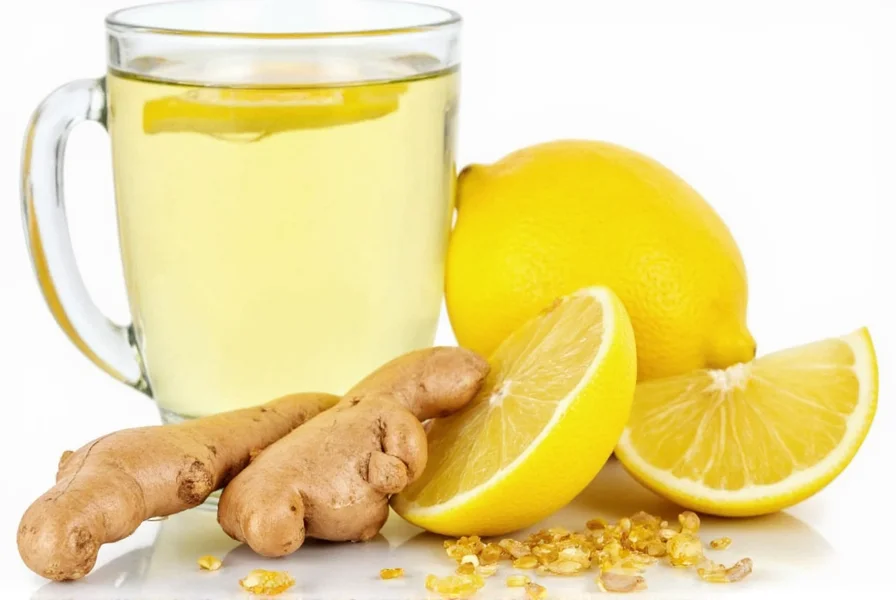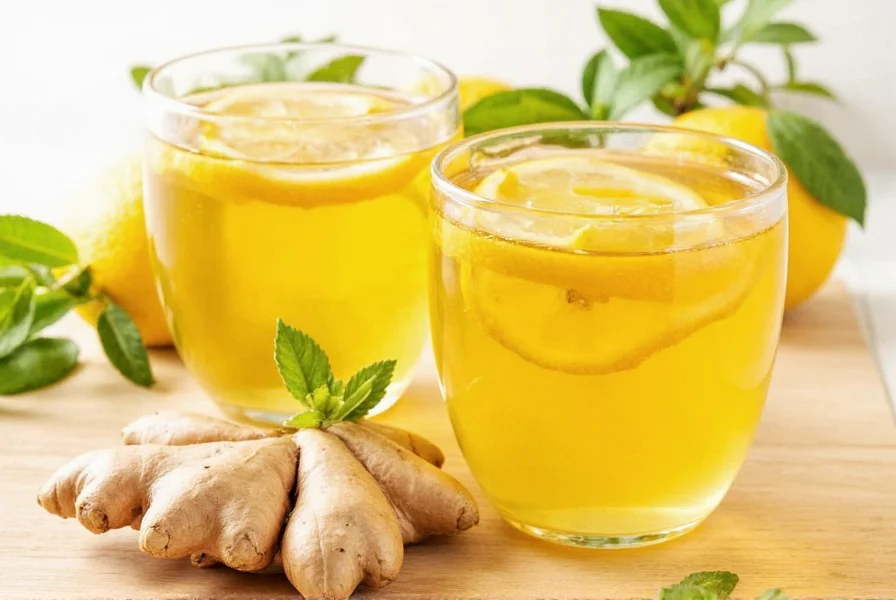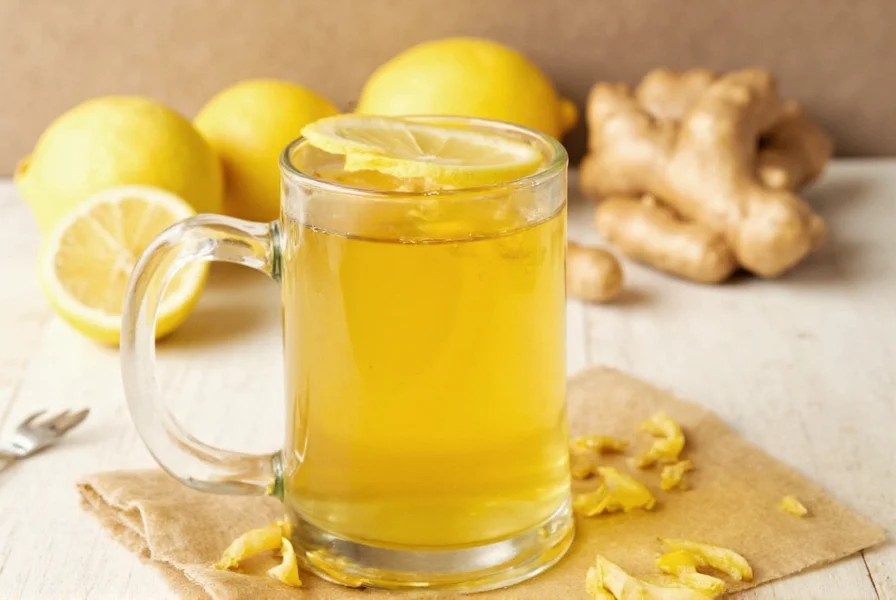Lemon ginger tea has become a staple in wellness routines worldwide, and for good reason. This simple herbal infusion harnesses the natural properties of two powerful ingredients that have been used in traditional medicine systems for centuries. Modern research continues to validate many of these traditional uses while revealing new potential benefits.
Science-Backed Health Benefits of Lemon Ginger Tea
Ginger contains bioactive compounds like gingerol that give it potent anti-inflammatory and antioxidant properties. A 2020 review published in Nutrients confirmed ginger's effectiveness in reducing nausea and vomiting, particularly for pregnancy-related morning sickness and chemotherapy-induced nausea. The vitamin C from lemon complements these effects by supporting immune function and enhancing iron absorption from plant-based foods.
Regular consumption of lemon ginger tea may support digestive health by accelerating gastric emptying. A clinical trial in the World Journal of Gastroenterology found ginger significantly reduced symptoms of functional dyspepsia. The combination also creates a synergistic effect—the acidity from lemon helps extract more gingerols from the root, potentially increasing bioavailability of these beneficial compounds.

How to Prepare Lemon Ginger Tea for Maximum Benefits
Creating an effective lemon ginger tea requires proper preparation techniques to maximize the extraction of beneficial compounds:
- Peel and thinly slice 1-2 inches of fresh ginger root
- Bring 8-12 ounces of filtered water to just below boiling (195-205°F)
- Add ginger to water and simmer gently for 10-15 minutes (longer for stronger tea)
- Remove from heat and add ½ sliced lemon or 1-2 tablespoons fresh lemon juice
- Steep an additional 5 minutes before straining
The simmering time significantly impacts potency—research shows ginger compounds extract most effectively between 10-15 minutes. Avoid boiling vigorously as this can degrade some beneficial compounds. Adding lemon after removing from heat preserves more vitamin C, which breaks down at high temperatures.
Potential Side Effects and Safety Considerations
While generally safe for most people, lemon ginger tea may cause issues for certain individuals. Ginger in high amounts (more than 4 grams daily) can cause heartburn, diarrhea, or mouth irritation in sensitive individuals. Those taking blood thinners should consult their physician before consuming large quantities, as ginger may enhance anticoagulant effects.
Lemon's acidity might exacerbate acid reflux symptoms in prone individuals. Dental professionals recommend drinking lemon-containing beverages through a straw and rinsing mouth with plain water afterward to protect tooth enamel. Pregnant women can safely consume moderate amounts (up to 1 gram of ginger daily), but should consult their healthcare provider about appropriate quantities.
| Herbal Tea Type | Primary Benefits | Best Time to Consume | Key Considerations |
|---|---|---|---|
| Lemon Ginger Tea | Digestion, nausea relief, immunity | Morning or before meals | May interact with blood thinners |
| Peppermint Tea | Irritable bowel syndrome relief | After meals | Avoid with GERD |
| Chamomile Tea | Sleep quality, anxiety reduction | Evening | May interact with sedatives |
| Green Tea | Antioxidants, metabolism support | Morning | Contains caffeine |
Debunking Common Lemon Ginger Tea Myths
Despite its popularity, several misconceptions surround lemon ginger tea. While many wellness blogs claim it "detoxifies" the body, the reality is your liver and kidneys already handle detoxification efficiently. The tea supports these natural processes but doesn't enhance them beyond normal function.
Another widespread claim suggests lemon ginger tea significantly boosts metabolism for weight loss. Current research shows any metabolic effect would be minimal—primarily from ginger's thermogenic properties. A 2019 study in Metabolism found ginger supplementation led to modest weight reduction (about 1.5 pounds over 12 weeks) when combined with diet and exercise, but not as a standalone solution.

Optimizing Your Lemon Ginger Tea Routine
For digestive support, consume 8-12 ounces 20-30 minutes before meals. Those experiencing morning sickness may benefit from sipping small amounts throughout the day. Adding a slice of fresh turmeric can enhance anti-inflammatory effects, while a small amount of black pepper increases curcumin absorption if using turmeric.
Quality ingredients matter—organic ginger and lemon reduce exposure to pesticides. Fresh ingredients provide more potent benefits than pre-packaged tea bags, though high-quality organic tea bags offer convenience. Store freshly made tea in the refrigerator for up to 48 hours, though consuming it immediately provides maximum vitamin C content.
Frequently Asked Questions
How often can you safely drink lemon ginger tea daily?
Most adults can safely consume 1-3 cups of lemon ginger tea daily. Research suggests up to 4 grams of ginger per day is generally safe for adults, which equates to approximately 3 cups of properly prepared tea. Those with sensitive stomachs may want to start with smaller amounts (½ cup) to assess tolerance before increasing consumption.
Does lemon ginger tea help with weight loss?
Lemon ginger tea may support weight management efforts but isn't a standalone solution. Ginger has mild thermogenic properties that can slightly increase calorie expenditure, and the tea can promote hydration and reduce cravings for sugary beverages. A 2019 study found ginger supplementation led to modest weight reduction (about 1.5 pounds over 12 weeks) when combined with diet and exercise, but the tea alone won't produce significant weight loss.
Can lemon ginger tea reduce inflammation?
Yes, research indicates lemon ginger tea has anti-inflammatory properties primarily from ginger's gingerol compounds. A 2015 review in Arthritis found ginger significantly reduced markers of inflammation and pain in osteoarthritis patients. The vitamin C from lemon also contributes antioxidant effects that help combat oxidative stress, though the tea shouldn't replace prescribed anti-inflammatory medications for chronic conditions.
Is lemon ginger tea safe during pregnancy?
Lemon ginger tea is generally considered safe during pregnancy in moderate amounts and is commonly recommended for morning sickness relief. The American College of Obstetricians and Gynecologists suggests limiting ginger to 1 gram daily during pregnancy, which equals about 1 cup of strongly brewed tea. Pregnant women should consult their healthcare provider before regular consumption, especially if they have a history of miscarriage or are at risk for preterm labor.
When is the best time to drink lemon ginger tea for digestion?
For optimal digestive benefits, consume lemon ginger tea 20-30 minutes before meals. This timing allows the ginger compounds to stimulate digestive enzymes and prepare your gastrointestinal tract for food. Some people also find relief from occasional indigestion by drinking a cup after meals. Those with acid reflux should avoid consuming it on an empty stomach and may want to reduce the lemon content to minimize acidity.











 浙公网安备
33010002000092号
浙公网安备
33010002000092号 浙B2-20120091-4
浙B2-20120091-4